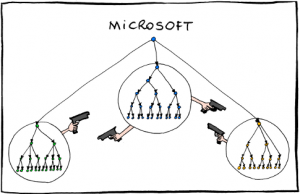More than often project managers are swamped with too much work and still refuse or procrastinate in delegating some of the work to one or more of the team members in the project team. This is not specific to project management and fear of delegation is known to be present in all sectors, professions and all positions within corporations and firms. Here below it is listed the most common reasons why project managers do not delegate, properly, timely or not at all and when they do, how should they go about it:
Barriers from the project manager
– Not enough time to properly explain the work to be performed and how
– Fear of losing control of the task delegated and that the result will be disastrous
– Fear of not getting credit for the quality and success of the delegated task
– Fear of losing tasks that are enjoyed and getting stuck with the unwanted tasks
– Fell that he/she can do it better and that the result will not be as perfect as it could
– Fear of delegating-self out of a job as the senior management sees others with competence
– Lack of confidence in team members with the fear that they will completely fail
Barriers from the team members
– Not enough time to understand and assimilate the task to be performed
– Not enough experience to execute such a task without asking too much and looking incompetent
– Fear of failure and that such a failure can have serious consequences
– Not their responsibility since tasks were not theirs in the first place
– Fear of being a scapegoat and that the PM is just setting one up for failure
– Reactions from other team members who may think you have some type of preference from the PM
Barriers from the situation
– Constrained resources, when money is the biggest concern in the organization and failure is not an option whatsoever
– Unclear hierarchy, when it is difficult to understand the lines of authority in the firm or corporation
Reasons not to delegate
– When there’s lack of clarity, if you cannot understand it yourself do not expect others to understand it either
– When you need the learning, so the delegation will prevent you from learning some core competence intrinsic to the task to be done
– When the project is too high stakes and it is best that you get it done yourself and are in control all the time
To whom should the PM delegate
– The experience, knowledge and skills of the individual
– The individual’s preferred work style
– The current workload of this person
How should the PM delegate
– Clearly articulate the desired outcome
– Clearly identify constraints and boundaries
– Where possible, include people in the delegation process
– Match the amount of responsibility with the amount of authority
– Delegate to the lowest possible organizational level
– Provide adequate support, and be available to answer questions
– Focus on results
– Avoid upward delegation
– Build motivation and commitment
– Establish and maintain control
Reference and sources:
http://spverma.wordpress.com/2012/06/11/why-you-should-delegate-more/
http://www.mindtools.com/pages/article/newLDR_98.htm
http://www.ncsu.edu/project/parkprgrd/PSTrainingModules/delegating/del12frame.htm





